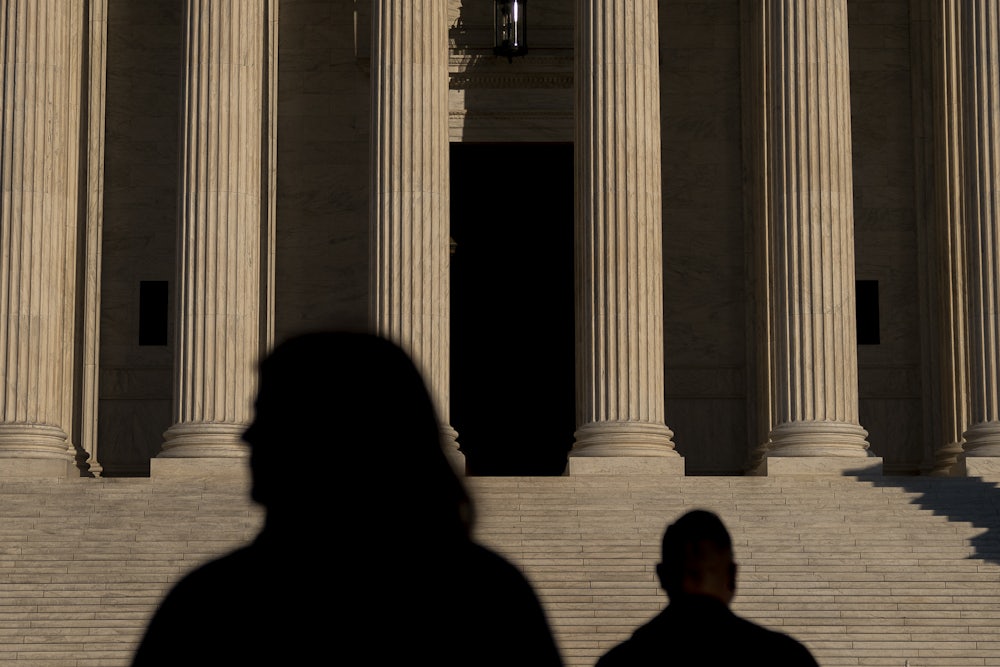The Supreme Court appears poised to curb the Securities and Exchange Commission’s in-house enforcement power on Seventh Amendment grounds. During more than two hours of oral arguments in Securities and Exchange Commission v. Jarkesy on Wednesday, the court’s conservative majority seemed to lean toward requiring the SEC to enforce civil penalties against securities fraudsters with a jury trial.
“What sense does it make to say the full constitutional protections apply when a private party is suing you but we’re going to discard those core constitutional historic protections when the government comes at you for the same money?” Justice Brett Kavanaugh asked Brian Fletcher, who represented the Justice Department, during oral arguments.
“As a general matter, it does seem to me to be curious that—and unlike most constitutional rights—that you have that right until the government decides that they don’t want you to have it,” Chief Justice John Roberts added later. “That doesn’t seem to me the way the Constitution normally works.”
Deciding the case on Seventh Amendment grounds would reshape how the SEC polices fraud and misconduct in the nation’s securities markets. And it could allow the justices to avoid weightier issues that threatened to reshape how regulators across the government enforce their rules.
George Jarkesy, the case’s namesake, is a right-wing radio host and former hedge-fund manager. The SEC charged him in 2013 with violating federal securities laws. According to the agency, Jarkesy lied to investors about who was running a pair of funds he founded, what they were investing in, whether they worked with prominent auditors and brokers, and so on. He also allegedly inflated asset values to charge higher management fees.
The SEC took Jarkesy’s case into administrative proceedings, meaning it was heard by what are known as administrative law judges instead of a regular federal court. They function as in-house adjudicators for certain regulatory cases. While they have many of the powers and privileges of normal federal judges, they are neither nominated by the president nor confirmed by the Senate. Many agencies rely on administrative law judges in some capacity to carry out their congressionally mandated functions, most notably in the immigration sphere.
The administrative law judge ruled in the agency’s favor, imposing civil sanctions on Jarkesy, including various restrictions on his ability to participate in the securities industry and a $300,000 civil penalty. Jarkesy challenged the SEC’s ability to levy those penalties on constitutional grounds. The Fifth Circuit Court of Appeals, which is always up for some mischief these days, sided with him in an expansive decision on how federal agencies can enforce their rules.
As a result, the Supreme Court took up three questions in Jarkesy. One was whether Congress violated the Constitution’s separation of powers by creating administrative law judges with for-cause firing protections. While most political appointees in the federal government serve at the president’s pleasure, Congress has also established that some can’t be fired by a president without cause.
Those officials typically serve in multimember boards that lead major financial regulatory agencies like the SEC, the Federal Trade Commission, and the Federal Reserve Board of Governors. Some conservative legal scholars argue that the president should be able to fire these people at will and that Congress infringes upon the executive branch’s prerogatives by forbidding it. In a 2020 decision, the Supreme Court’s conservative members struck down the for-cause provision that protected the Consumer Financial Protection Bureau’s director but went no further.
The second question was also about the separation of powers, but from a different angle. Jarkesy argued that Congress violated it by allowing the SEC to choose whether to pursue claims before its in-house adjudicators or before a regular federal court. This claim rested on the nondelegation doctrine, a largely moribund theory in constitutional law that holds that one branch of government cannot “delegate” its powers to another branch of government.
That doctrine has only been invoked by the Supreme Court twice and not since the 1930s, predating the rise of the modern “administrative state,” a term critics use to describe the network of federal agencies set up by Congress during and after the New Deal. Some conservative justices have favorably referred to reviving the doctrine, which would make it easier to kneecap federal regulatory agencies—a key goal of the conservative legal movement. But the court has also declined a few opportunities to revisit it in recent years, suggesting that not everybody might be on board.
That streak continued on Wednesday as the justices only fleetingly addressed the nondelegation question. (And unless I missed it while sneezing, they didn’t discuss the for-cause removal question at all.) Instead they focused on the third question raised by the SEC’s petition: whether Congress’s decision to allow the SEC to use in-house adjudication for civil enforcement penalties violated the Seventh Amendment’s right to a jury trial.
One key issue is whether the SEC’s enforcement actions count as “suits at common law,” a phrase in the Seventh Amendment that refers to the unwritten body of judge-made law that the American legal system inherited from England after the Revolution. That includes traditional common-law claims like fraud and negligence. In 1977, the Supreme Court ruled that OSHA’s administrative enforcement for workplace safety violations did not violate the Seventh Amendment because it created a new claim outside the common law through statute.
“The difference is that, there and here, Congress has enacted a federal regulatory regime that doesn’t just federalize securities fraud or federalize negligence in workplaces the way some of Your Honor’s hypotheticals were positing, but it erects a comprehensive federal scheme that goes well beyond common law fraud,” Fletcher told the justices.
The court’s liberals tried to emphasize that distinction when they had the opportunity. “So it’s a suit at common law because you have the common law claim that is now implicating the Seventh Amendment right,” Justice Ketanji Brown Jackson remarked toward the end of Fletcher’s time. “But it’s not a suit at common law when Congress creates a new duty and gives it to the SEC or some agency to enforce through administrative proceedings.”
Michael McColloch, who argued on Jarkesy’s behalf, strongly disagreed with that framework. “My friend’s really radical position is antithetical, totally antithetical, to the Founders’ intent,” he told the justices in his opening statement. (Lawyers arguing before the court refer to each other as “my friend” by convention.) “The jury trial right should apply especially when the government is coming after a citizen for penalties on a common law claim.”
Some of the justices, especially on the court’s conservative flank, appeared sympathetic to McColloch’s argument that the SEC was trying to circumvent the Seventh Amendment for fraud-related claims in a way that private individuals could not. But the court’s liberals needled him on the scope and breadth of his claims.
“We’ve never suggested that in a case where Congress has given an agency the power to enforce something, and the agency is bringing the charge, if you will, that’s [not] settled,” Justice Elena Kagan told McColloch, later referring to the 1977 Supreme Court case. “Nobody has had the chutzpah, to quote my people, to bring it up since Atlas Roofing.”
If the court resolves the case in Jarkesy’s favor on Seventh Amendment grounds, it could have sweeping implications for how the government resolves a variety of administrative claims. It could also radically expand the workload of the regular federal courts, something that might prompt the justices to decide the case as narrowly as they can. But, at least for now, it means the court will once again take a look at upending the “administrative state” before stepping back from the ledge.










